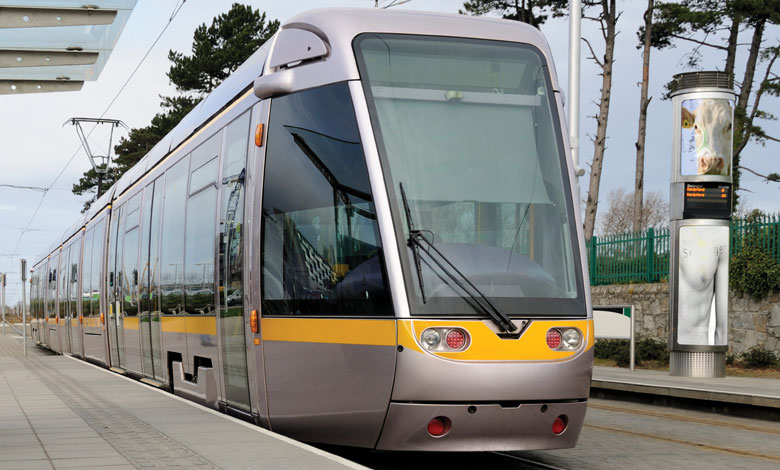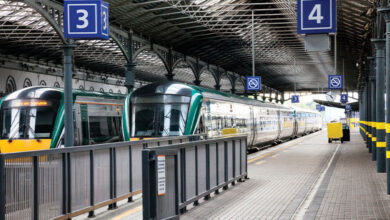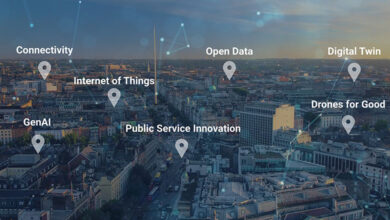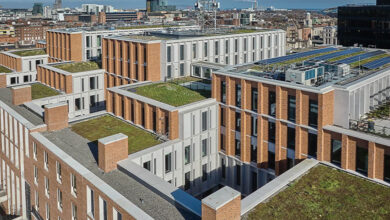Major public transport infrastructure programmes: An insight into Jacobs’ approach to successfully unlock Irish growth
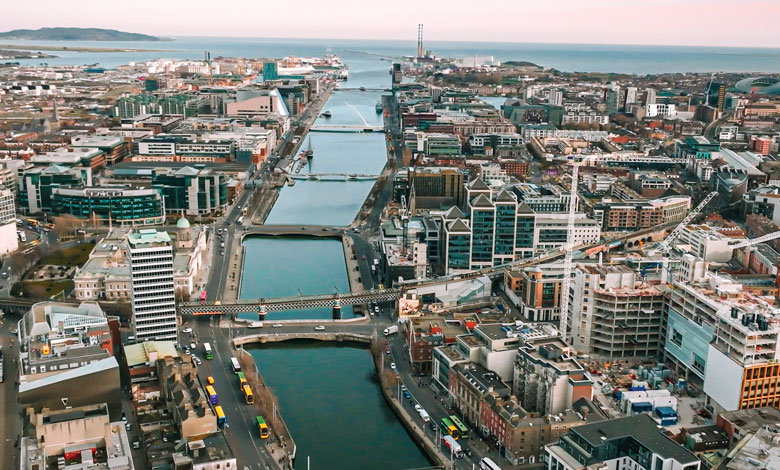
Ireland’s rapid growth over the last 20 years has led to a significant step change in the scale and complexity of projects required to meet its growing needs. Jacobs has been a leading player in delivering transport infrastructure across the globe for over 50 years, contributing to some of the most exciting projects worldwide and in Ireland.
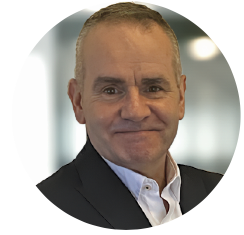 Jacobs sits down with Willie Fraser, its Global Rail and Transit Market Director, to talk about the new era of mega projects dawning over the country. These transformative projects promote innovation and technology, transform regions, unlock economic growth and provide for our collective future.
Jacobs sits down with Willie Fraser, its Global Rail and Transit Market Director, to talk about the new era of mega projects dawning over the country. These transformative projects promote innovation and technology, transform regions, unlock economic growth and provide for our collective future.
Some of our recent infrastructure delivery contributions in Ireland include the emerging preferred route for Cork Luas, the North Runway project at Dublin Airport, and supporting the NTA to take BusConnects Dublin through tendering and into construction. In the UK, we have supported the Thames Tideway Tunnel programme, safeguarding the River Thames from pollution, and the Crossrail project, revolutionising London’s transport network with the new Elizabeth Line.
Our portfolio extends globally, with our recent work in Canada leveraging European experience to drive major schemes including the Metrolinx scheme in Toronto and the Translink BRT programme in Vancouver. We consistently focus on sustainable development and providing environmental benefits for the local community. We are seeing a huge focus on investment in rail projects because of their sustainable attributes.
Our success in these major infrastructure projects is underpinned by three key factors – our technical expertise, our programme management capability and our ability to inject our global experience into local project teams. We have local talent on the ground in major hubs across Ireland and the UK. These teams have a real stake in the communities we work in and are able to harness our global network and innovation to bring significant change at a local level. Our global expertise enables us to offer unique insights to every project, no matter the scale.
“We offer unique expertise, deploying technical and programme delivery specialists on diverse global programmes, bringing lessons from one city’s first-of-a-kind project to another,” says Willie Fraser. “You need to have delivery capability, but also the ability to support clients with the bigger picture, such as understanding the business case and maintaining public support through stakeholder engagement. Our commitment is to sustain projects across political cycles, ensuring continuity and resilience.”
What do you think of the changing transport landscape?
“We are fortunate to be working within one of the pivotal technological shifts of our time that ties in with the increasing demand for sustainable local transport around the world,” says Fraser. “Major cities are becoming more and more congested, increasing commuter travel times, local traffic, loss of productivity, and reduced air quality. Cities from the Middle East to the USA, India to Malaysia, and across Europe are turning to rail systems to provide faster, more reliable, and sustainable transport solutions.”
In Ireland, rapid growth combined with urbanisation is being increasingly served by electrified rail projects to compliment the major active travel and bus network benefits of BusConnects. DART+, Luas and MetroLink are prime examples. Jacobs has been at the forefront, developing schemes to enhance communities around the world.
So why are governments investing in rail projects such as high-speed, LRT, metro, and other electrified modes?
“The answer lies in the global themes of supporting city growth, promoting sustainability, improving connectivity for affordable housing and realising the economic benefits of faster movement of people to where they want to go.” Connectivity and economic activity go hand-in-hand; transport enables balanced growth across regions, improving productivity gaps and income inequality.
What are the key success factors for these generational mega projects?
With projects of this scale, the challenge is significant. Major projects are technically complex and capital-intensive. Clients need to secure experience and deep domain expertise to maximise value generation and safeguard their investment, balancing aspiration with affordability and their own capability. The technical aspects involve highly complex engineering and construction delivery, while the social and economic benefits are transformational. Commercially, these projects require very high capital investment over long development periods, and they involve multiple governments across the project lifecycle.
Strong leadership with a positive and inspirational public narrative is key to securing and retaining support for a transformative mega-project through its journey of setbacks and successes. Communicating a project’s expansive social and economic benefits, how they serve the community, and the ‘why’, is crucial.
“The challenge is even greater when it is new,” says Fraser. “Governments that have done this before roll out new projects or expansions in cycles – like the Metro in Madrid. Once they have done it once, they are not deterred by the pitfalls – but unless you have this experience and have done it elsewhere, there will be unseen things you are not prepared for or willing to risk. That is where Jacobs comes in.”
At Jacobs, we support our clients in navigating complex projects that span changes in leadership and economic cycles, to provide for future generations. Some of the projects we are delivering today were first conceived decades ago. Sustained commitment, supported by delivery expertise, is essential to realising our clients’ long-term vision.
We build teams that combine our global experience with deep local knowledge and insight to ensure successful project outcomes. It is crucial that our project teams bring the right blend of technical and programme management capabilities tailored to the sector – such as rail – and within that, possess specialised knowledge in submodes like metro and light rail.
These programmes require technical understanding, delivery capability and global expertise. We must not only grasp the technical specifics but also understand the socioeconomic value and the business case. Supporting our clients in making programmes affordable – and in maintaining the support of both governments and the public – is essential for major investments. A deep understanding of these critical factors shapes our delivery focus, driving key outcomes such as meeting project milestones, minimising community disruption, controlling costs and achieving innovation-led efficiencies.
Risks emerge and evolve throughout a project’s lifecycle – and for mega-projects, they do so on a far broader and more complex scale. To safeguard project outcomes and our clients’ interests, we must anticipate and manage a full spectrum of risks: from known-knowns and known-unknowns to the elusive unknown-unknowns. The latter are particularly prevalent in mega projects due to their scale, complexity, and many stakeholders. We establish agile and experienced delivery teams to respond and adapt as the project develops, maintaining strong collaboration throughout. We also connect our clients directly to share lessons learnt, and we bring in Jacobs’ subject matter experts to help solve emerging challenges.
What does holistic programme delivery look like for Jacobs?
We manage major projects with a true cradle-to-grave approach, partnering with our clients to shape the programme structure, vision and success factors. From the outset, we engage clients and stakeholders to understand and build in the project’s fundamental requirements in the early stages, before tracking them through delivery. We thrive on translating technical, environmental and operational requirements into controlled, efficient delivery. By combining our best global talent, tools and solutions with strong local capability, we deliver transformational outcomes.
We also encourage contractors to innovate, bringing their expertise to the project, and aim to set up projects to enable this. We support contractors throughout design development and provide robust guidelines to ensure the final outcome meets project objectives and stakeholder expectations.
“Step-change projects affect communities during construction, with pain before gain. We work hard to minimise this while also delivering the benefits.”
For instance, project management of construction delivery in a congested urban environment – such as Dublin – poses unique challenges. We draw on our in-depth local knowledge to collaborate closely with local stakeholders, identifying key traffic flows to enable effective traffic management and minimise local disruption. Stakeholder engagement is continuous throughout construction, with dedicated teams keeping local communities informed about working hours, diversions, and major activities such as piling or blasting.

Major projects span several years. We use this time to train and develop staff, build sustainable teams and create career-enhancing opportunities. This strengthens the growth and resilience of local teams. We extend our culture into schools through site safety and STEAM (Science, Technology, Engineering, Arts, and Mathematics) learning sessions, positively contributing to the communities we serve.
Do any flagship programmes showcase your global capability at a local level?
The Doha Metro Project is a testament to our ability to deliver a comprehensive suite of services and capabilities, showcasing our role as an integrator in one of the world’s largest metro projects. We provided Project Management and Construction Management services, ensuring seamless coordination and integration across 42km and 18 stations, from downtown Doha to the New Doha International Airport. We implemented rigorous quality control measures to uphold the highest standards. Our role was pivotal in bringing together stakeholders – including government agencies, contractors and local communities – for better decision-making and problem-solving.
“Doha was a real testament to what a team as large as ours at Jacobs can offer in the major programmes space,” says Fraser. “Our services included project management, construction management, quality assurance and stakeholder coordination. We oversaw the entire project lifecycle, from planning and design to execution and completion, ensuring that construction activities were carried out efficiently, safely and within budget. Our integration efforts contributed to the first section being opened to the public a year earlier than planned.”
What are some of the key challenges Jacobs navigates in the earlier project stages, to lay the groundwork for successful delivery?
All major projects are subject to rigorous and complex local permissions. It is essential to meet local and national expectations on environmental impact (such as ecological, noise, vibration, electromagnetic compatibility and air quality), as well as constraints like limited working space (particularly in urban areas), flood risk, managing heritage buildings and minimising impact to existing local services. Jacobs’ experienced planning teams are skilled at understanding and addressing local concerns. They work with planning authorities, engaging our design teams to develop sustainable, effective solutions that respond to community needs and environmental priorities.
Our Dublin-based team holds significant expertise in Environmental Impact Assessments and Transport Impact Assessments, providing appropriate solutions which enhance the local community and minimise disruption. We are always conscious that designs need to evolve with changing circumstances and account for the impact of parallel projects.
We are in a new age of automation and digital disruption. How are we harnessing the latest technology?
Technology is transforming how communities use transport and is essential for building a sustainable future. Jacobs continually monitors emerging developments to ensure our transport solutions and delivery capabilities remain at the forefront of the industry.
“In rail projects, we collaborate with leading suppliers to provide innovative solutions, such as the installation of Computer Based Train Control (CBTC) systems,” comments Fraser. “These systems allow for remote management of driverless trains, offering energy-saving operations and more frequent services than would be possible with traditional signalling.”
We have successfully implemented CBTC on new lines such as Dubai Metro and the Ampang (Malaysia) line, as well as retrofitting PATH in New York/New Jersey and the New York Subway. “We hope to bring what we have learned from this global cross-pollination and the automated transport revolution back to our Irish projects,” adds Fraser. “Much of our rolling stock team’s experience was earned through our various roles in Irish Rail over the last two decades.”
Technology advancements extend beyond physical improvements in design and construction – they are also transforming how we deliver projects. We use industry-leading tools, including proprietary solutions, to automate and enhance our design, construction and programme management processes. This includes live progress tracking across multiple data sources, 4D/5D modelling for integrated cost and schedule planning and control, and demand modelling to optimise construction resource and materials planning.
How do we embed safety across every aspect of our delivery?
“Safety is who we are; it is at the core of everything we do. For that to prevail as the fabric of the fast-paced and complex major programmes we deliver, it must be a matter of culture and behaviours, embedded in our people and our partners.”
Our strong safety culture is underpinned by our BeyondZero® programme, which has been running for over 20 years. All staff are encouraged to think actively about safety in everything they do. We foster a mindset that drives safer practices and positively impacts design, construction, operation and maintenance. “Our BeyondZero approach also has a positive effect on our client team culture, threading safety-first thinking through the project lifecycle,” adds Fraser. “Ultimately, we need to look after each other, and to care – about what is in front of us, and the bigger picture.”
In our projects across the world, we relentlessly navigate safety in design, evolving construction practices, operational improvements and sustainability challenges to set the benchmark for best practices and deliver outstanding results for our clients. Our deeply ingrained culture of caring ensures that safety and excellence are inseparable. “If anyone is up to the task, it is Jacobs.”
W: www.jacobs.com

